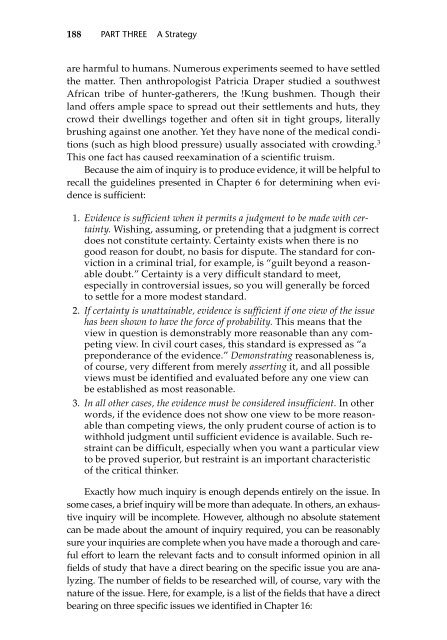Beyond Feelings
Beyond Feelings
Beyond Feelings
Create successful ePaper yourself
Turn your PDF publications into a flip-book with our unique Google optimized e-Paper software.
188 PART THREE A Strategy<br />
are harmful to humans. Numerous experiments seemed to have settled<br />
the matter. Then anthropologist Patricia Draper studied a southwest<br />
African tribe of hunter-gatherers, the !Kung bushmen. Though their<br />
land offers ample space to spread out their settlements and huts, they<br />
crowd their dwellings together and often sit in tight groups, literally<br />
brushing against one another. Yet they have none of the medical conditions<br />
(such as high blood pressure) usually associated with crowding. 3<br />
This one fact has caused reexamination of a scientific truism.<br />
Because the aim of inquiry is to produce evidence, it will be helpful to<br />
recall the guidelines presented in Chapter 6 for determining when evidence<br />
is sufficient:<br />
1. Evidence is sufficient when it permits a judgment to be made with certainty.<br />
Wishing, assuming, or pretending that a judgment is correct<br />
does not constitute certainty. Certainty exists when there is no<br />
good reason for doubt, no basis for dispute. The standard for conviction<br />
in a criminal trial, for example, is “guilt beyond a reasonable<br />
doubt.” Certainty is a very difficult standard to meet,<br />
especially in controversial issues, so you will generally be forced<br />
to settle for a more modest standard.<br />
2. If certainty is unattainable, evidence is sufficient if one view of the issue<br />
has been shown to have the force of probability. This means that the<br />
view in question is demonstrably more reasonable than any competing<br />
view. In civil court cases, this standard is expressed as “a<br />
preponderance of the evidence.” Demonstrating reasonableness is,<br />
of course, very different from merely asserting it, and all possible<br />
views must be identified and evaluated before any one view can<br />
be established as most reasonable.<br />
3. In all other cases, the evidence must be considered insufficient. In other<br />
words, if the evidence does not show one view to be more reasonable<br />
than competing views, the only prudent course of action is to<br />
withhold judgment until sufficient evidence is available. Such restraint<br />
can be difficult, especially when you want a particular view<br />
to be proved superior, but restraint is an important characteristic<br />
of the critical thinker.<br />
Exactly how much inquiry is enough depends entirely on the issue. In<br />
some cases, a brief inquiry will be more than adequate. In others, an exhaustive<br />
inquiry will be incomplete. However, although no absolute statement<br />
can be made about the amount of inquiry required, you can be reasonably<br />
sure your inquiries are complete when you have made a thorough and careful<br />
effort to learn the relevant facts and to consult informed opinion in all<br />
fields of study that have a direct bearing on the specific issue you are analyzing.<br />
The number of fields to be researched will, of course, vary with the<br />
nature of the issue. Here, for example, is a list of the fields that have a direct<br />
bearing on three specific issues we identified in Chapter 16:


